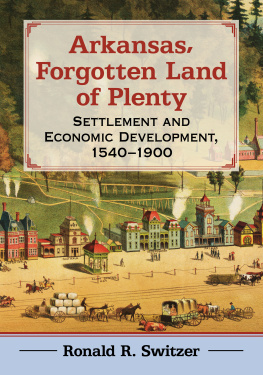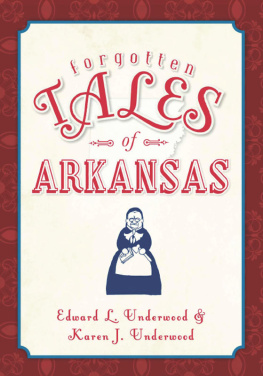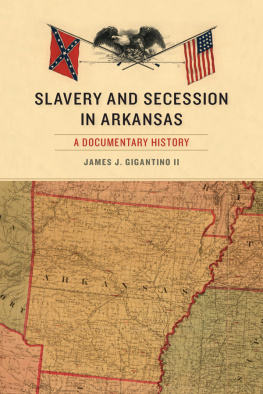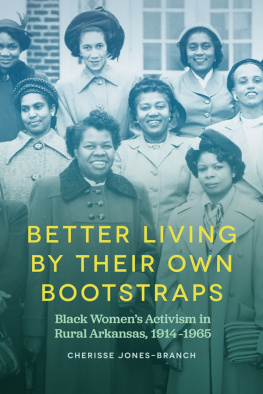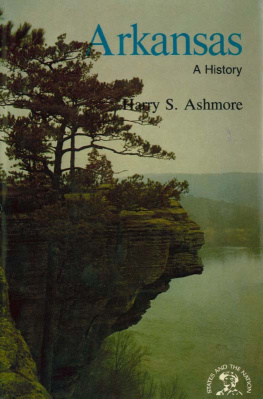
Arkansas, Forgotten Land of Plenty
Settlement and Economic Development, 15401900
RONALD R. SWITZER

McFarland & Company, Inc., Publishers
Jefferson, North Carolina
LIBRARY OF CONGRESS CATALOGUING DATA ARE AVAILABLE
BRITISH LIBRARY CATALOGUING DATA ARE AVAILABLE
e-ISBN: 978-1-4766-3613-9
2019 Ronald R. Switzer. All rights reserved
No part of this book may be reproduced or transmitted in any form or by any means, electronic or mechanical, including photocopying or recording, or by any information storage and retrieval system, without permission in writing from the publisher.
Front cover: Hot Springs, Arkansas bath houses, ca. 1888 (LIBRARY OF CONGRESS)
McFarland & Company, Inc., Publishers
Box 611, Jefferson, North Carolina 28640
www.mcfarlandpub.com
Preface
Although I did not know it then the seeds for this book were generated more than 40 years ago when I began work to document the cargo, crew and passengers of the steamboat Bertrand, a sternwheeler that sank in the Missouri River 20 miles north of Omaha on April 1, 1865. Research on the cargo made me aware of how material culture shaped the lives of so many people on the western frontier. In addition, biographies of the intrepid passengers on the steamboat opened a whole new world for me and my understanding of why the story of the opening of the West needed to be told through the people that made it happen. Their successes and failures in the Trans-Mississippi West often rested on how well they interacted with uncompromising environments. Individually and collectively they set about creating occupations and industries that led to conquering and civilizing the frontier. Town building rested on the degree to which local and regional resources were exploited and developed to provide economic stability.
It seemed to me that very little work that had been done to understand the economics and social structure of settlement and the growth of commerce in some of the states immediately west of the Mississippi River. I perceived that few authors had tackled the job of divining the development of commerce in the states that were impacted by the imperial travails of France and Spain or by the influx of Anglo-Americans after the acquisition of Louisiana Territory by the United States. Works by Morris Arnold, S. Charles Bolton, Harry S. Ashmore, Robert Bradshaw Walz and the prolific works of Arthur Goodspeed are notable exceptions. My frustration about these matters led to curiosity that became infatuation with further exploring the development of commerce in the West generally, and specifically in states like Oklahoma and Arkansas. This became an opportunity, and I resolved to stand this subject on a firmer base by writing the social and economic history of Arkansas from a different perspective. Were I up to that task I would have to write a compendium that would successfully explore the development of specific occupations and industries though the people most directly involved. That is to say I would use biographical sketches.
So, this book is about two things: the settling and economic development of Arkansas. I categorically examine specific occupations and industries and look at the personas of those directly involved through the use of biographical information. It is not about nor does it delve into the subject of Arkansas politics and their evolution from pre-territorial days to statehood and after, unless it is necessary to illuminate a particular topic. Nor does this book dwell on the contentious matter of manifest destiny. Instead, it attempts to focus on the unique and individual character of Arkansas and Arkansans through time. Arkansas has a distinctive and intricate past that has intrigued Americans for generations and hopefully this book will contribute to a better understanding of its history and people.
Explanatory Note
Some explanation is in order concerning what this book is and is not about. I have used the terms Indian, and Native American interchangeably throughout the text. The use of the word Indian in a 19th century context stems from a political descriptor used by the United States Government referring to indigenous peoples of the country, not referring to race. Most of the Eastern tribes that were resettled in Indian Territory between 1828 and 1842 had seen infusions of European blood, and many outwardly exhibited acceptance of Anglo-American culture and society while retaining their traditional lifeways, customs, and religious practices. Later, use of the terms Indian and Native American came to apply also to the offspring of Anglo and Indian marriages or to Anglos who were adopted into the tribes, giving them rights and privileges of full-blood tribal members. Unfortunately, some have construed Native American to mean any individual of extended Anglo European origin who was born in the United States and not a citizen of an Indian tribe, and semantics have become complex. To simplify things, in the context of this book, the terms Indian and Native American mean the same thing.
Introduction
The purpose of this book is to demonstrate something of the character of the people who interacted with the rich tapestry of the land in Arkansas between 1540 and 1900. It also will topically illustrate the exploration and settlement of Arkansas and the development of its commerce over a period of nearly 300 years, drawing heavily upon biographical portrayals of the states determined makers.
Early European explorations into Arkansas were intent on two things: determining the physical nature and wealth of the interior of Arkansas and laying empirical claims to the undisturbed lands and resources by colonizing them. The rough geography of Arkansas and the ignorance of the early colonists regarding how to bring the wilderness under productive agriculture played strongly against the development of civilization and commerce. Yet after more than two hundred years of such attempts by France and Spain, it was the Americans who came west from the eastern seaboard, the Ohio River Valley and the South who ultimately conquered the land, established successful towns and gave a sense of independent identity to Arkansas. Still, the remoteness of Arkansas made settlement and the development of agriculture and commerce an exceedingly slow embrace by early settlers who bore the brunt of criticism and humor and who shouldered the image of Arkansas as a socio-economic backwater of the American West.
One only has to delve into Arkansass past to realize that its development as a territory and state was dependent upon the racial, cultural and social array of its early settlers and their purposeful interaction with the land. The East was a restless place from which emigrants to Arkansas fled, especially after 1830, seeking land they could call their own and not be encumbered by the restraining social and class divisions of the East that prevented them from achieving individual success. Taming the land was just plain difficult and some early settlers showed no interest in developing improvements and lived off the land in comfortable ignorance of the outside world. However, the great diversity and talents of many later Arkansans enabled them to put down roots and start farms and businesses that led to town building and further successes.
Commerce developed slowly because of the remoteness of communities and their limited means of access to the outside world. The development of roads was toilsome and expensive, making transportation on Arkansass river system a necessity. All of the major Arkansas towns grew on the banks of its streams. In fact, during the steamboat era between 1830 and the 1870s there collectively was more commercial steamboat traffic on Arkansas rivers than on other western waterways. Hundreds of steamboats plied the Arkansas, Red, White, Black, and Ouachita Rivers and their tributaries carrying goods necessary to sustain individuals and businesses and carrying wild products, agricultural produce and manufactures to New Orleans, Memphis, St. Louis and other commercial centers.
Next page
